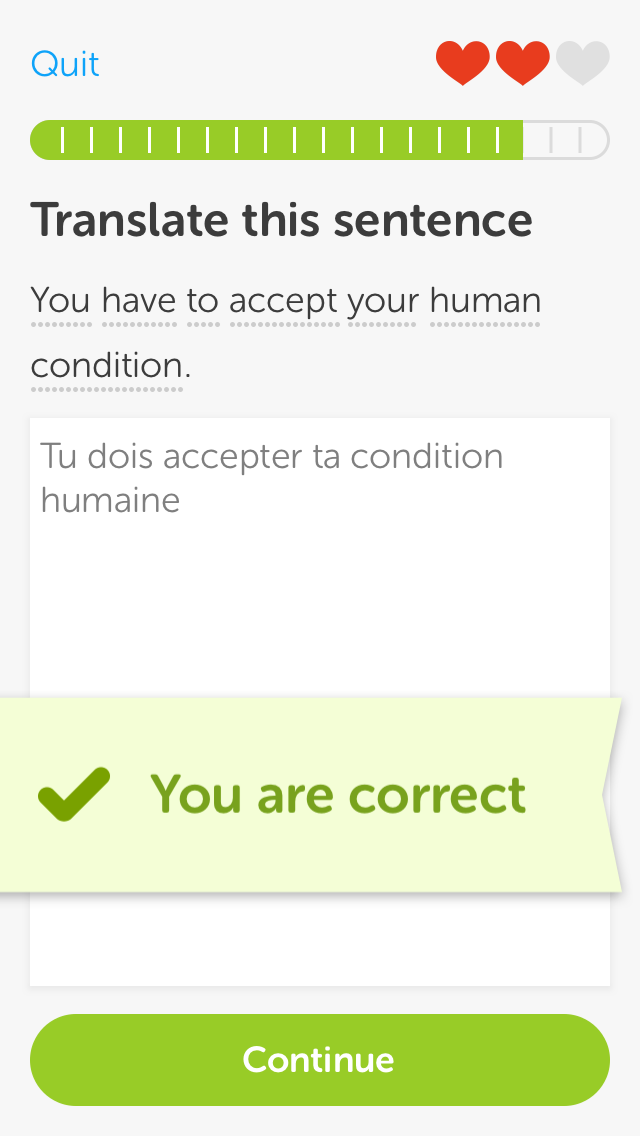When I first started with Duolingo, I tested right into lesson 52 of French. This got me to a vocab level where the app thinks I should handle the following sentences:
“We needed fire.”, “You have to be big.”, “You must eat more.”
I’m not sure that I could come up with many sentences that I am even less likely to use in my life, or to enjoy translating. Because the app generates its sentences automatically, you don’t really get anything that’s very in-depth. In fact, this sentence from a critical review over at Hacking Portuguese sums it up perfectly for me:
The sentences are so far removed from anything that you might actually want to use in conversation that I doubt how much value there is in rote translation.
2. It’s the Translation Pre-Sets
Now, again this is the complaint of an accomplished language learner and not a beginner. I understand that Duolingo isn’t really built with me in mind. For the sake of this post, I tried out both a language I’m proficient at (French) and one that I didn’t know well at all (Danish). Yet I feel it’s justified to complain if they’re going to offer high-level grammatical structures that no one encounters before year 3 or 4 of French, then the computer just needs to become better at knowing that there is way more than one possible translation for most sentences. For a system that builds user habit and loyalty based on little hearts, I lose way too many hearts because I phrase my answers slightly differently than the computer wants me to do this. This is so incredibly frustrating, and so far removed from a joyful and challenging approach to language acquisition that it makes me want to shut down the app straight away.
3. It’s the Machine
I cannot tell you how much I dislike the computer voice. It doesn’t intone, it doesn’t emote, it’s just blank. A blank canvas of words coming at me. Who learns a language for that? Languages are about people. I wish they’d play and work with snippets from media shows or real people’s recordings. Just think of the big efforts Audio Lingua and Rhinospike are making in this area, and you can see that automated heartless computer voices really don’t need to be used in automated language instruction.
Whenever I switch on Duolingo, I get to a place that sits between boredom and outright irritation. Its mechanical, box-ticking structure reminds me of the worst in education, when learners are simply put in front of a multiple choice test and made to regurgitate whatever they had crammed into their minds before. This is not what language learning is about, and this is not how to become good at it. I just straight out refuse to believe that Duolingo can incite the same excitement that a book, a conversation or a foreign tv show could. It doesn’t do it for me.
4. It’s the Lack of Explanations
So here is the thing: Immersion is fine, but I don’t think it’s the answer to all of an adult learner’s language issues. Starting with this app means making up your own explanations for why things are right, it means trial and error. I get the sense that here is where “immersion” becomes completely pointless. In this app, you learn by parroting phrases without even beginning to cover the background stories that grammar and pragmatics tell. I have seen so many forum posts and emails from language learners who felt like they were completely losing the plot and ever wondering “Why am I getting this bit wrong?”. Duolingo would make me so much happier if it provided grammar references, even the most basic ones, and a perspective telling the user “Here’s why people say things this way”. I just cannot fathom how any self-respecting adult learner would put themselves in this babylike position where they simply take the word of a robot as the law. Language learning should make you curious, while this feels to me like it wants to create robots.
Perhaps surprisingly, the aspect of explanation is another thing that the Tell Me More version of Rosetta Stone has been doing rather well. Rosetta certainly isn’t free, but I think it is not comparable.
In Conclusion
This review of Duolingo might fly in the face of what many language beginners experience when they first start interacting with the app. In fact, our regular writer Angel has recently shared her own experiences and lauded Duolingo for a lot of the good stuff it does. The “learning game for adults” aspect of the app is brilliant, and I commend Duolingo for giving millions of people something to do when they feel a little bored online.
I've recently examined Duolingo's advantages in this article, which is exactly how to use this app to really learn a language.
My thoughts come from the point of view of a language teacher, someone who wants people to get into feeling the language instead of simply mastering its technical aspects. Just like the promise of fluency that many tools throw at you, I want you to feel that you have a right to make up your own mind about the Duolingo system. You can use this once a week, you can use it intensively for a few days and run out of steam, or you can just never try at all. Whatever you do, it won’t make you a better or worse language learner.
You’re not going about this the wrong way - in fact, if you are just getting started with a new language, here’s my advice: don't make Duolingo your first stop because it's too likely to be your last. There are lots of cheap ways to start learning a language, so make sure that you put something into place that really is productive and doesn’t just feel that way because you earn 200 meaningless points on an app every day.
Have you had good experiences using Duolingo? Have you stuck with it for more than two weeks? I'm sure there are many ways in which you could argue I'm wrong, and I'd love to hear a few in the comments.
If you Enjoyed This Article..
And finally, I also recorded a podcast episode full of ideas about what you can do when/if you start to get bored by Duolingo.
If you enjoyed this article, HIGH FIVE! Why not sign up to my newsletter and read more news from my world? I look forward to seeing you on the road to fluency.






